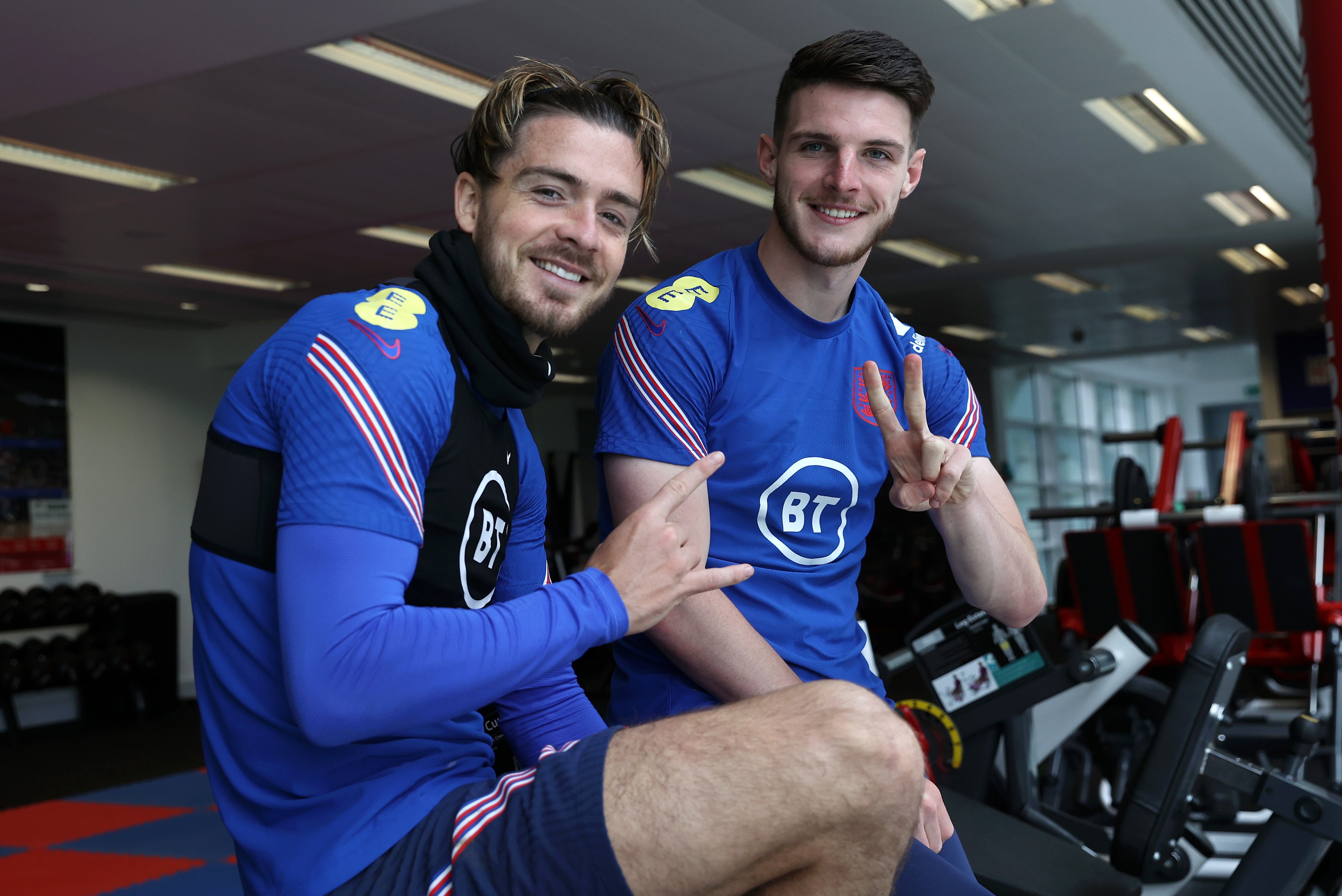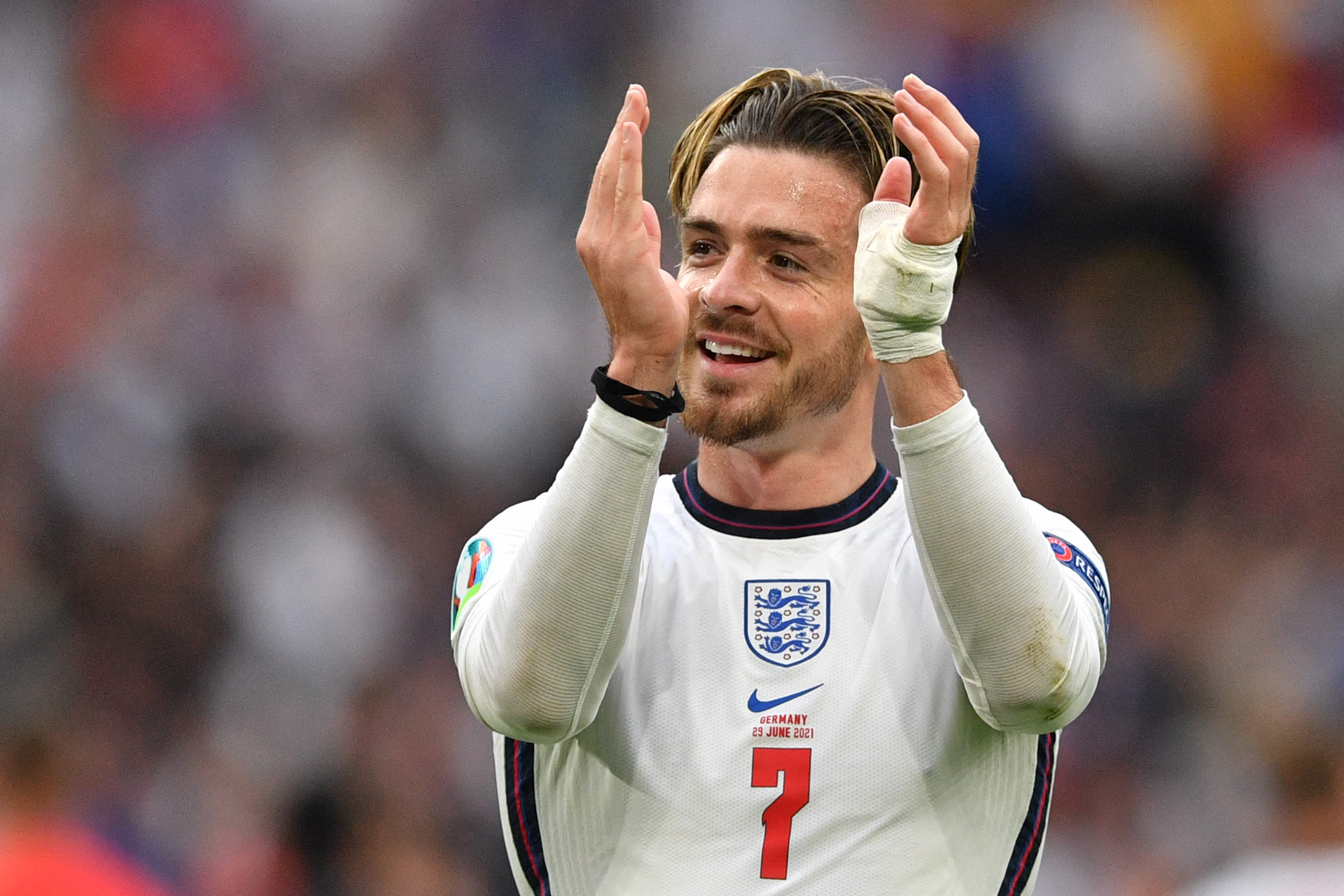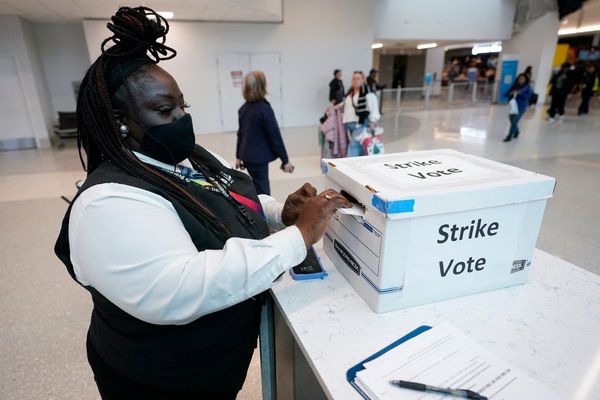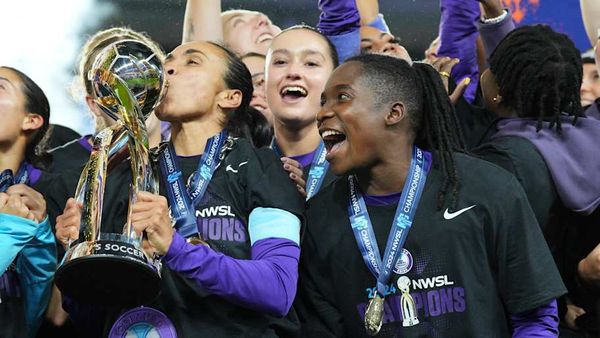
‘Jack Grealish, king of the free men/ Man of the match, throw a party in the evening’ – The Manor, ‘Grealish’
“I just woke up,” says Jack Grealish at half four in the afternoon, but if he looks like he has just got out of bed then at least he is in good company with the group of national newspaper journalists sitting down in front of him. A nap in the middle of the day is part of his routine now, anyway. “I’m not the same man without it.”
It is an unconventional sleeping pattern but then what else did you expect? This is the most unconventional player and personality to represent England in a generation. Or then again, is he? Grealish may be different to other footballers, but a huge part of his charm is that he is actually an intensely normal young man by anyone’s standards.
Listen to him talk at length for a decent amount of time and you pick up little cues that point to this. He can, for example, effortlessly drop into a conversation the number of times he’s played at Wembley, as though he is keeping count and considered each one a privilege.
When the subject of the England fans singing his name is raised, he talks with a genuine and sincere sense of wonder, as though this really shouldn’t really be happening to him. “It’s weird, because… like, I don’t know how to explain it. It’s nice when Villa fans are doing it but you expect it because you’re one of them, but when it’s England it’s different.”
Recommended
What would he be if he wasn’t a footballer? “A club promoter. Tenerife or Ibiza”. And what would he be doing this summer, during the tournament? “If I was just with my mates and stuff I would just be doing what they’re doing. I’d be travelling everywhere watching England, being in pubs and stuff.
“I’d f****** love it, definitely,” he says. “I think I’d be at that Boxpark. I’ve seen a few videos of that and it looked unreal, so I think that’s what I’d be doing, because at the end of the day I’m just a normal kid.”
He is a normal kid. He is an ordinary, everyday ‘Jack the lad’ character – throw a pint in the air at Boxpark and you’d splash 10 of them, at least – but that character appears to have struck a chord with England’s support. His relaxed and plainspoken manner has endeared him to the press, too.
This sit-down starts late – Jack needs his nap, you see – but lasts practically half an hour, three times longer than most of the others organised by England’s media team at St George’s Park during this tournament, and there is still plenty to ask once it’s over. One subject comes up several times, though, and never reaches a satisfactory answer.
Why is he so popular? Why do people relate to him? Why does apparently everyone love Jack?
“I don’t know! You tell me,” he says. “I just go out and try to repay people with my performances. That’s what I do at Villa. Villa fans give me so much love, I go out there and try and repay them. When I come here it is different. I get booed every single week by these fans!
“I’ve said before, when I watched in 2018 in Russia, it was something that brought the nation together. When I speak to my mum and dad they think it’s so nice that people are not going: ‘F*** him, if he was at Villa we’d boo him every week’. They are all giving me that support and doing it for the whole team, and it’s so nice to see them being part of that.”
When pushed, Grealish suggests that his playing style is the reason behind the popularity. “I try and get fans off their seats. I try and attack as much as possible and I think that’s what fans want to see. I try and do as much as I can. I know what I am good at. I try and be as positive as possible all the time, no matter who I am coming up against, whether it’s the lowest ranked team or the highest.”
That’s a plausible explanation, but then several other England players are just as proactive on the ball, just as skilful in possession. Grealish described his five rivals for a place alongside Harry Kane in the attack as “scary” yesterday, but none of them have captured their nation’s imagination in quite the same way he has.
That suggests the answer lies beyond football, perhaps in Grealish’s well-documented extra-curricular activities, and maybe with a group of south London-based rappers who have captured the Grealish moment we are all living in better than anyone else.
The Manor are three MCs – Jonny Dutch, Danny Graft and Scotty Stacks – who have released a new single simply called “Grealish”. Set over a euphoric house beat, the lyrics are an ode to everyone’s new favourite England player, focusing on his heroics on the pitch but also some of his antics off it.
The lines reference Grealish scoring a brace at Molineux and winning man-of-the-match awards, but also booking holidays on his phone while down at the pub and partying in the Burj Khalifa. “Brum Town Baggio, or Di Canio/ Got your ex blowing up balloons on my patio” is a reference to his nitrous oxide episode in 2015 and this correspondent’s personal favourite.
Dutch and Graft are Arsenal supporters who were left in awe of Grealish’s ability earlier this season. “Back in November he was playing really well, he battered us at the Emirates, and Dan’s little brother made this song,” Dutch tells The Independent. “We thought, let’s call it ‘Grealish’, let's write a song about Grealish.”
The track was held back until the start of the tournament, at which point Dutch and his bandmates spread the word around, reaching out to anyone they could contact who is connected to Grealish in some way, desperately hoping that the track would be passed onto him and he would hear it.
Grealish eventually learned about the song after his cousin in Australia – who knew The Manor from listening to them at late-night after-parties – told him about it. He was a little anxious, hoping anything that had his name to it would be good. “He listened and thought it was a banger,” says Dutch. “He genuinely loved it.”
If England win the tournament, the plan is for Grealish to fly out to Ibiza for one night this summer and shoot a music video with The Manor. “I promised them that,” Grealish admits. “To be fair I have promised about 10 different people 10 different things.”
The obvious question is: what was it about Grealish, specifically, that inspired the song?
“If you listen to our music, we’re party boys but we’re a little bit old school as well,” says Dutch. “Not only is Jack a very techy, exciting player to watch but there’s an old school sort of maverick vibe to him. It’s something like Gazza or even before that, and the way he wears his socks down like Rui Costa.
“I watched a thing on ITV a few years ago about mavericks and how this country doesn’t tend to appreciate the maverick player,” he adds. “We’ve had the Glenn Hoddles, the John Barneses, and he falls into that category.”
Though a little more straightlaced, David Beckham is another point of comparison. “I’m just about old enough to remember in ’98, Hoddle didn’t start Beckham and Michael Owen in the first game and I’m old enough to remember the clamour, because Beckham was that guy,” Dutch adds.
“He was going out with a Spice Girl, he was the face of everything, then he comes in for redemption against Colombia and scores the free kick, and it was that sort of vibe with Jack. History repeats itself in everything – music, football, fashion, whatever you want – and I thought this was the time for him to have one of those sort of tournaments.”

Unfortunately for Grealish, as Dutch points out, English football has an awkward history with players who do not fit the mould, dating back most notably to the 1970s.
While the years of hurt were still in their infancy, Sir Alf Ramsey’s utilitarian approach was viewed not only as the best route to success, but the only one. A distrust of flair and flamboyance grew, and the international careers of nonconformists like Stan Bowles, Rodney Marsh and Charlie George among others were stunted.
There is a tale, for example, of how George was informed by his manager at Derby County that he had been called up to Ron Greenwood’s England B team. He replied: “Tell him C is for Charlie, C is for class and I don’t play for no f****** B team.” This was English football’s great generation of lost maverick talent but others have struggled too.
Hoddle’s international career never hit the heights it could have. Paul Gascoigne earned a place in the nation’s heart but his eccentricities were seen as flaws before the 1990 World Cup. Matt Le Tissier could not gain the trust of several England managers. Beckham’s lowest point as an international player is well documented.
Grealish is just the latest in that lineage. He is this England squad’s individualist, its free spirit, its Joe Namath to Harry Maguire’s Johnny Unitas with his haircut you could set your watch to. He would not change any of that, either. Something he repeats throughout this sit-down with the dailies press is that he is simply trying to be his “own person”.
At one point though, there is a tinge of regret, and a suggestion that his maverick streak may have held him back. As a 25-year-old with only 10 caps, he knows he is already having to make up for lost time. Does he wish his England career had come sooner? “Yeah of course,” he says, “but 100 per cent that’s down to myself. That isn’t down to anybody else.”
While deliberating whether to represent England or the Republic of Ireland, Grealish sat down with then England manager Roy Hodgson. He left the conversation encouraged that his debut would come sooner rather than later. “I thought it was going to be the start of my international career and it wasn’t,” he says.
Relegation at Villa and – more pertinently – off-the-field disciplinary incidents followed, and the door to the senior squad closed for a while. “So it’s nobody else’s fault, it’s my own.” But even as a late bloomer at international level, he is still in an extremely enviable position, living out every other normal kid’s dream.
“When we were writing the song, we said this is the player who if we were footballers, if we were gifted with any sort of talent, we'd be just like Jack,” says Dutch. “You’re maybe going to get the odd front-page headline which may rub your club up the wrong way but you’re also going to be back page, winning games for your team every week as well.”

There is a deliberate structure to the track, Dutch reveals. “One verse was to cover who he is as the man, the bit of the party boy and the celebrity, and the other was to cover the football side of things. We wanted to cover both sides and they’re the two reasons why we love him; he’s like us and because of the way he plays.”
For all the theories about Grealish’s growing popularity, that feels like the most convincing: that many fans look at him and see themselves, but also see everything they wanted to be; the player they dreamed of becoming if they were talented enough, and still the person that they have become anyway.
There’s also a flip side to that, though, because you get the impression that even right in the middle of an international tournament, two days out from a European Championship quarter-final, and as everyone wants to be like Jack, part of Jack wants to be like everyone else.
“As I’ve grown up, that’s probably one of the hardest things I’ve had to deal with. I speak with my family about it all the time. When I go out and do stuff, I look at what my friends are doing all the time and I’d love to be like that sometimes and to be able to go out and do stuff, but I don’t know…”, he says, trailing off.
Sometimes, the Brum Town Baggio would prefer to just be Jack from Birmingham. “Since I first came onto the scene, no one knew me and I could do anything I wanted to, to then playing in the FA Cup semi-final and final in the space of two months and then everyone knew who I was.
“It was difficult to deal with,” he admits, “but I feel like I have matured so much and it has helped me on and off the pitch.” He has made mistakes – more than some players who have not been rehabilitated in the eyes of the public and the media in the same way – and says he has learned from them. “Of course. That is the only thing you can do.”
He is growing, he is maturing. But he knows, at the same time, there are some things that he will never be able to change about himself. “Deep down I am still the Jack that I was when I was young,” he says, “and I will never not be that person.” And you sense that his public love him even more for it.







